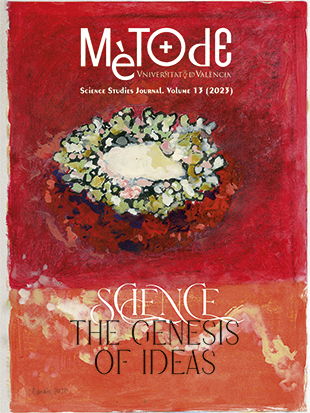Re-imagining One Health: A perspective from social science
DOI:
https://doi.org/10.7203/metode.13.23821Keywords:
One Health, interdisciplinary framework, risk, social sciences, zoonoses Abstract
Abstract
One Health is a framework focusing on the dynamic intersections between humans, animals, and ecosystems regarding health systems and practices. As human decisions and actions are the locus of One Health challenges, it is critical to understand how people perceive and act on these connections. Fundamentally, the literature in this area is based in the natural and health sciences; further efforts are still necessary to fully realize the potential of bringing social research squarely into One Health. We suggest several areas of scholarship that could move this effort forward.
 Downloads
Downloads
 References
References
Ahmadun, F.-R., Wong, M. M. R., & Said, A. M. (2020). Consequences of the 2004 Indian ocean tsunami in Malaysia. Safety Science, 121, 619–631. https://doi.org/10.1016/j.ssci.2019.05.016
Beall, J. M., Casola, W. R., Peterson, M. N., Larson, L. R., Carr, W. A., Seekamp, E., Stevenson, K. T., & Jackson, S. B. (2021). Cultural cognition and ideological framing influence communication about zoonotic disease in the era of Covid-19. Frontiers in Communication, 6, 645–692. https://doi.org/10.3389/fcomm.2021.645692
Béné, C., Mehta, L., McGranahan, G., Cannon, T., Gupte, J., & Tanner, T. (2018). Resilience as a policy narrative: Potentials and limits in the context of urban planning. Climate and Development, 10(2), 116–133. https://doi.org/10.1080/17565529.2017.1301868
Bourbeau, P. (2018). A genealogy of resilience. International Political Sociology, 12(1), 19−35. https://doi.org/10.1093/ips/olx026
Courtenay, M., Sweeney, J., Zielinska, P., Brown Blake, S., & La Ragione, R. (2015). One Health: An opportunity for an interprofessional approach to healthcare. Journal of Interprofessional Care, 29(6), 641–642. https://doi.org/10.3109/13561820.2015.1041584
Economic Research Service. (2021). The meatpacking industry in rural America during the Covid-19 pandemic. https://www.ers.usda.gov/covid-19/rural-america/meatpacking-industry
Florin, M.-V., & Linkov, I. (Eds.). (2016). IRGC resource guide on resilience. EPFL International Risk Governance Center. https://doi.org/10.5075/epfl-irgc-228206
Hernando-Amado, S., Coque, T. M., Baquero, F., & Martínez, J. L. (2020). Antibiotic resistance: Moving from individual health norms to social norms in one health and global health. Frontiers in Microbiology, 11, 1914. https://doi.org/10.3389/fmicb.2020.01914
Hueston, W., Appert, J., Denny, T., King, L., Umber, J., & Valeri, L. (2013). Assessing global adoption of one health approaches. EcoHealth, 10(3), 228–233. https://doi.org/10.1007/s10393-013-0851-5
Lapinski, M. K., Funk, J. A., & Moccia, L. T. (2015). Recommendations for the role of social science research in One Health. Social Science & Medicine, 129, 51–60. https://doi.org/10.1016/j.socscimed.2014.09.048
Nowling, W. D., & Seeger, M. W. (2020). Sensemaking and crisis revisited: The failure of sensemaking during the Flint water crisis. Journal of Applied Communication Research, 48(2), 270–289. https://doi.org/10.1080/00909882.2020.1734224
Overby, J., Rayburn, M., Wyld, D. C., & Hammond, K. (2005). Looming cognition for global competition: The approaching avian influenza pandemic. Asia Pacific Journal of Marketing and Logistics, 17(2), 17–30. https://doi.org/10.1108/13555850510672322
Pan American Health Organization. (2015). Building communities of practice. https://iris.paho.org/handle/10665.2/35000
Partelow, S. (2018). A review of the social-ecological systems framework: Applications, methods, modifications, and challenges. Ecology and Society, 23(4), 36. https://doi.org/10.5751/ES-10594-230436
Ranji, S. R., Steinman, M. A., Shojania K. G., & Gonzales, R. (2008). Interventions to reduce unnecessary antibiotic prescribing: A systematic review and quantitative analysis. Medical Care, 46(8), 847–862. https://doi.org/10.1097/MLR.0b013e318178eabd
Rogers Van Katwyk, S., Grimshaw, J. M., Nkangu, M., Nagi, R., Mendelson, M., Taljaard, M., & Hoffman, S. J. (2019). Government policy interventions to reduce human antimicrobial use: A systematic review and evidence map. PLOS Medicine, 16(6), e1002819. https://doi.org/10.1371/journal.pmed.1002819
Saylors, K., Wolking, D. J., Hagan, E., Martinez, S., Francisco, L., Euren, J., Olson, S. H., Miller, M., Fine, A. E., Thanh, N. N. T., Minh, P. T., Kalengkongan, J. D., PREDICT Consortium, Kusumaningrum, T., Latinne, A., Pamungkas, J., Safari, D., Saputro, S., Bamba, D., … Mazet, J. A. (2021). Socializing One Health: An innovative strategy to investigate social and behavioral risks of emerging viral threats. One Health Outlook, 3, 11. https://doi.org/10.1186/s42522-021-00036-9
Sellnow, T. L., Parker, J. S., Sellnow, D. D., Littlefield, R. S., & Helsel, E. M., Getchell, M. C., Smith, J. M., & Merrill, S. C. (2017). Improving biosecurity through instructional crisis communication: Lessons learned from the PEDv outbreak. Journal of Applied Communications, 101(4). https://doi.org/10.4148/1051-0834.1298
Smith, R. A., M’ikanatha, N. M., & Read, A. F. (2015) Antibiotic resistance: A primer and call to action. Health Communication, 30(3), 309–314. https://doi.org/10.1080/10410236.2014.943634
Soares, A. (2020). William Karesh: Championing «One Health». Bulletin of the World Health Organization, 98(10), 652–653. https://doi.org/10.2471/BLT.20.031020
Stokols, D. (1996). Translating social ecological theory into guidelines for community health promotion. American Journal of Health Promotion, 10(4), 282–298. https://doi.org/10.4278/0890-1171-10.4.282
Downloads
Additional Files
Published
How to Cite
-
Abstract1408
-
PDF761
-
(Español)1
Issue
Section
License
![]()
All the documents in the OJS platform are open access and property of their respective authors.
Authors publishing in the journal agree to the following terms:
- Authors keep the rights and guarantee Metode Science Studies Journal the right to be the first publication of the document, licensed under a Creative Commons Attribution-NonCommercial-NoDerivatives 4.0 International License that allows others to share the work with an acknowledgement of authorship and publication in the journal.
- Authors are allowed and encouraged to spread their work through electronic means using personal or institutional websites (institutional open archives, personal websites or professional and academic networks profiles) once the text has been published.





